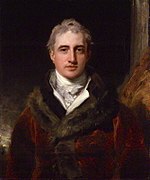Robert Stewart, Viscount Castlereagh, Date of Birth, Place of Birth, Date of Death
TweetRobert Stewart, Viscount Castlereagh
British politician
 Date of Birth: 18-Jun-1769
Date of Birth: 18-Jun-1769
 Place of Birth: Dublin, Leinster, Ireland
Place of Birth: Dublin, Leinster, Ireland
Date of Death: 12-Aug-1822
Profession: politician, diplomat
Zodiac Sign: Gemini 
About Robert Stewart, Viscount Castlereagh
- Robert Stewart, 2nd Marquess of Londonderry, (18 June 1769 – 12 August 1822), usually known as Lord Castlereagh, derived from the courtesy title Viscount Castlereagh (UK: KAH-s?l-ray) by which he was styled from 1796 to 1821, was an Anglo-Irish statesman.
- As British Foreign Secretary, from 1812 he was central to the management of the coalition that defeated Napoleon.
- He was the principal British diplomat at the Congress of Vienna.
- Castlereagh was also leader of the British House of Commons in the Liverpool government from 1812 until his suicide.
- Early in his career, as Chief Secretary for Ireland, he was involved in putting down the Irish Rebellion of 1798 and was instrumental in securing the passage of the Irish Act of Union of 1800. Castlereagh's challenge at the foreign office was to organise and finance an alliance to destroy Napoleon.
- He successfully brought Napoleon's enemies together at the Treaty of Chaumont in 1814.
- Thereafter he worked with Europe's leaders at the Congress of Vienna to provide a peace consistent with the conservative mood of the day.
- At Vienna he was largely successful in his primary goal of creating a peace settlement that would endure for years.
- He saw that a harsh treaty based on vengeance and retaliation against France would fail, and anyway the conservative Bourbons were back in power.
- He employed his diplomatic skills to block harsh terms.
- He held the Chaumont allies together, most notably in their determination to finally end Napoleon's 100 Days in 1815.
- He had a vision of long-term peace in Europe that united efforts of the great powers.
- At the same time he was watchful of Britain's mercantile and imperial interests.
- He purchased the Cape Colony and Ceylon from the Netherlands.
- France's colonies were returned, but France had to give up all its gains in Europe after 1791.
- In 1820 he enunciated a policy that Britain would not intervene in European affairs – a policy that was largely adopted down to 1900. As the Irish Secretary during the Rebellion of 1798, he took the lead in suppressing the rebellion and restoring order.
- Castlereagh encouraged lenient treatment of the rebels after they surrendered, but many Irish denounced him as a traitor.
- Criticism increased when he supported Pitt's Act of Union which abolished the Irish Parliament.
- Castlereagh was a consistent supporter of Catholic emancipation.
- In 1805 he became the Secretary of State for war and proved to be highly effective in reforming recruitment, and securing the appointment of Arthur Wellesley as commander in Spain.
- He resigned in 1809 after government splits and an unsuccessful war.
- He then fought a duel with George Canning, a fellow Tory; they both survived.
- With intense devotion to multiple duties from both the foreign office and as leader of Commons, he was badly overworked.
- He came under deep psychological distress in 1822, fearing exposure of homosexuality.
- Castlereagh committed suicide just before he was to represent Britain at an international Congress After 1815 Castlereagh was the leader in imposing repressive measures at home.
- He was hated for his harsh attacks on liberty and reform.
- John Bew stresses the paradox: No British statesman of the 19th century reached the same level of international influence....But very few have been so maligned by their own countrymen and so abused in history.
- This shy and handsome Ulsterman is perhaps the most hated domestic political figure in both modern British and Irish political history.
Read more at Wikipedia



